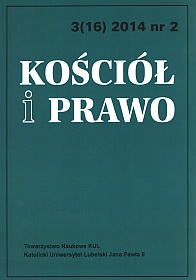Nova causae propositio w Kodeksie Prawa Kanonicznego z 1983 roku i Instrukcji procesowej Dignitas Connubii
Abstrakt
The Legislator in the proceedings in annulment of a marriage mentions remedies against the judgement such as an action for nullity of the judgement (querela nullitatis contra sententiam), appeal (appellatio) and the request for a retrial of the case after two consistent judgments (nova causae propositio). The distinction of so many remedies of the judgement may stem from the fact that the judgement can be voidable or unjustified, but the major aim of the proceedings are primarily to get to the objective truth about the contested marriage. Notwithstanding that, Nova causae propositio is not an appeal of the judgement in the strict sense of the word, to which the legislator includes the above- mentioned appeals and actions for nullity of the judgement. Admittedly it is a measure against the judgement, however it is not to challenge its validity. The purpose of this institution is to provide justice. Thus, the request for a reconsideration of the case by double-conforming judgements initiate the proceedings in exceptional circumstances and it is an extraordinary remedy against the judgement, exercise of which is subject to compliance with strict conditions ascertained by the legislator. Proceedings in fact are conducted as a result of bringing this request are allowed only when in the specific case concerning the status of parties with two consistent judgements and there are no other options for a possible appeal.
Bibliografia
Erlebach Grzegorz, Wybrane kwestie dotyczące rozumienia zgodności wyroków (art. 291 DC), w: Finis legis Christus. Księga Pamiątkowa dedykowana Księdzu Profesorowi Wojciechowi Góralskiemu z okazji siedemdziesiątej rocznicy urodzin, red. J. Wroceński, J. Krajczyński, t. I, Warszawa 2009, s. 365-383.
Greszata Marta, Iudicium cum principiis. Kodeksowa weryfikacja wybranych zasad procesowych w kanonicznych sprawach o nieważność małżeństwa, Lublin 2008.
Greszata Marta, Tytuł XII. Podważenie wyroku, w: Komentarz do Instrukcji procesowej Dignitas connubii, red. T. Rozkrut, Sandomierz 2007, s. 363-373.
Gullo Carlo, La „nova causae propositio”, w: Il processo matrimoniale canoni-co, „Studi Giuridici” XXIX, Città del Vaticano 1994, s. 797-823.
Rozkrut Tomasz, Zasada zgodności formalnej i substancjalnej dwóch wyroków w kanonicznym procesie małżeńskim według Dignitas connubii, w: Proces małżeński w świetle Dignitas connubii – pierwsze doświadczenia. Materiały z ogólnopolskiego spotkania pracowników sądownictwa kościelnego w Gródku nad Dunajcem w dniach 11-12 czerwca 2007 roku. III Ogólnopolskie Forum Sądowe, red. T. Rozkrut, Tarnów 2008, s. 87-102.
Stankiewicz Antoni, Le prove e gli argomenti nuovi per il riesame della ca-usa, Apollianaris 68 (1995), s. 487-519.
Sztychmiler Ryszard, Część II. Proces sporny. Komentarz do kan. 1501-1655, w: Komentarz do Kodeksu Prawa Kanonicznego, t. V: Księga VII. Procesy, red. J. Krukowski, Poznań 2007, s. 127-315.
Copyright (c) 2014 Kościół i Prawo

Utwór dostępny jest na licencji Creative Commons Uznanie autorstwa – Użycie niekomercyjne – Bez utworów zależnych 4.0 Międzynarodowe.





